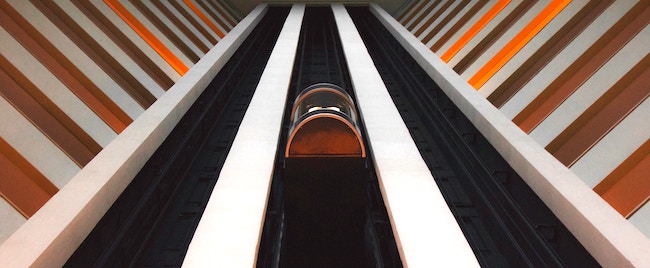
God told Moshe, “Speak to Aharon, and tell him that when he lights up the menorah—beha’alosecha, the seven lamps should illuminate towards the menorah.” (Bamidbar 8:1-2)
IT’S EITHER UP or down. There is no neutral ground in the spiritual world, except for angels. They’re called “Omdim,” or “Standers,” because, for the most part, an angel can’t go higher or lower than the world into which it was created.
Not so for man. He either goes up or down spiritually day-to-day, and sometimes, even from moment-to-moment. Even when resting, it is either an aliyah—going up—or yeridah—for a person, though sometimes it can be a “yeridah tzorech aliyah”—a going down for the sake of going up after.
It’s like getting into an elevator on the first floor to go to the second floor, but heads for the basement first. Surprised to feel downward movement, you look at the button board only to realize that someone had pressed the “B,” which means having to go down before going up.
It’s a lot more dramatic in life though. Going back up is not merely a matter of pressing another button and waiting for things to change. Sometimes people don’t even realize they’re going down until it is too late, and NEVER go back up again the rest of their life, or at least THAT life. The trick is to avoid a yeridah as much as possible, and that is an important part of the message of this week’s parsha.
When a person lights Shabbos candles, there is a halachah to not take the match away from the candle until the majority of the wick is burning. Otherwise, the flame might go out, and either one candle will not be burning on Shabbos as planned, or someone might come to profane the Shabbos by accidentally lighting it after they have already accepted Shabbos upon themselves.
We see this halachah in this week’s parsha. The verse says, “when he lights up the menorah,” the language indicates that the person who does the lighting should make sure the candles are burning independently. He should not have to relight any of them, and nor should a person who has kindled Shabbos candles.
Or taught a child—you shouldn’t have to “rekindle” THEIR “flame” either. Just as the kohen lights the menorah, a parent first lights a child’s intelligence, and if done properly, the flame of intellectual curiosity and integrity will burn brightly all of their life.
There are many ways to do this, but essentially, there are really two points to keep in mind. First of all, we all learn in innocence. Every child comes into this world uncorrupted and expecting consistency of thought. What we often mistake as naivety is really an inborn and precious intellectual innocence that has to be nurtured, not washed away with adult rationalizations.
Of course the world is not this way, and a child will find out soon enough. Ya’akov Avinu had to deceive his father and steal his brochos, for whatever reason Divine Providence made that necessary. But he never rationalized it, instead praying to God that he would never let it change his level of spiritual purity and intellectual honesty, as it has done to so many throughout history.
Children pick up on intellectual inconsistency early. Then they have the choice of either losing respect for their parents, and later, their teachers, or becoming corrupt like them. Both options are not optimal in any way.
The second point is learned from the menorah lighting itself. In order for it to work, patience is not enough. You have to make sure you have a good container, enough fuel, a quality wick, and, or course, a source of fire. In other words, a good burning flame requires all the proper “ingredients” at the start to make the flame possible in the end.
A parent/teacher must do this for their child/student as well. They have to provide the means for them to quite automatically pursue the right kind of knowledge, in the proper way, and with the greatest chance for success. It can’t be left to someone else to do, and certainly not left to “chance.” The most intellectually-productive people in society tend to have come from homes in which this was a priority.
As high a priority as education is in society, it is not SO high. The Torah world places the greatest emphasis on education, even celebrating it twice a year, once on Shavuos and once on Simchas Torah. It may not place much emphasis on secular education, but Torah education is held in high esteem.
Yet, for all of its importance, Torah education sometimes assumes too much about its teachers and its systems. One of the reasons why it has not kept up with the times and therefore, kept ALL of its students, is because it has not been creative enough, or taken full advantage of what it can do today to make chinuch so much more alive. Today’s educational system depends too much on the nature of the child to make their own fire of Torah burn independently.
People like to argue against this and point their finger in all kinds of directions when attaching blame for the problem. The reality is, however, that there is a major crisis in the Torah world, and it is not only with respect to those who have turned their backs on Torah. It’s even affecting those who will always remain Torah observant, at least on the outside. It’s their inside that struggles, and that can unfortunately have an impact on their next generation.
Beha’alosecha. We need to light those fires. We need to light them in a way that guarantees there’s no going down, not even for the sake of going up again.


